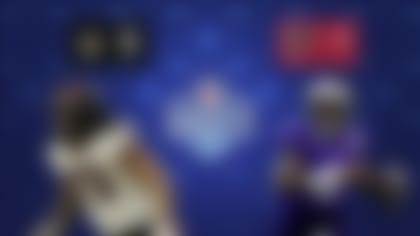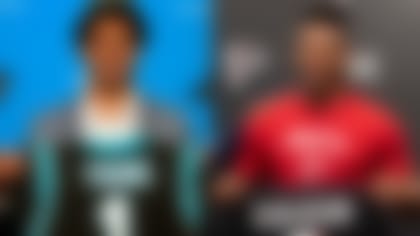Why provide instant grades on the selections of prospects who have yet to take an NFL snap? Well, you're reading this, aren't you? Considering the makeup of every roster and the factors surrounding each pick, Gennaro Filice and Nick Shook attempt a division-by-division assessment of the 2024 NFL Draft. Keep in mind that these grades are based on draft hauls alone -- picks traded for veteran players were not taken into account. Below is Nick's AFC East report card.
Round 1: Drake Maye, QB, North Carolina (No. 3 overall)
Round 2: Ja'Lynn Polk, WR, Washington (37)
Round 3: Caedan Wallace, OT, Penn State (68)
Round 4: Layden Robinson, OG, Texas A&M (103) | Javon Baker, WR, UCF (110)
Round 6: Marcellas Dial, DB, South Carolina (180) | Joe Milton III, QB, Tennessee (193)
Round 7: Jaheim Bell, TE, Florida State (231)
It’s a new era in New England, and the face of it will be Drake Maye, a quarterback the Patriots were so convinced was their man, they rebuffed trade offers for the No. 3 pick. This class will ultimately be judged on Maye’s performance, which will also be tied to the play of the second player the Patriots chose, Ja’Lynn Polk. It’s taking me some time to shake the old notion of what a Patriots player is -- Ladd McConkey felt like a good fit for the previous regime under Bill Belichick -- now that Jerod Mayo and Eliot Wolf are running the show, but this draft will help, I think. I loved their decision to double down at receiver by taking Javon Baker in an attempt to finally remake the NFL’s thinnest receiving corps. Their investment in two linemen should give New England one instant starter (Caedan Wallace) and a guard (Layden Robinson) to develop. Selecting Joe Milton III wasn’t a bad decision, either, because he’ll get time to develop, and you just cannot teach the arm strength he possesses.
Round 1: Olumuyiwa Fashanu, OT, Penn State (No. 11 overall)
Round 3: Malachi Corley, WR, Western Kentucky (65)
Round 4: Braelon Allen, RB, Wisconsin (134)
Round 5: Jordan Travis, QB, Florida State (171) | Isaiah Davis, RB, South Dakota State (173) | Qwan'tez Stiggers, CB (176)
Round 7: Jaylen Key, DB, Alabama (257)
I give Jets GM Joe Douglas two gold stars for, first, admitting failure on Mekhi Becton and then drafting a long-term cornerstone replacement in Olumuyiwa Fashanu, who -- judging by Tyron Smith’s well-documented injury history -- will see the field at some point in 2024. I’m also very much on board with Douglas’ vision in choosing Malachi Corley, giving the Jets a player in the Deebo Samuel mold. He should complement Garrett Wilson and Mike Williams quite well. Braelon Allen is an absolute tank of a running back and another perfect complement to Breece Hall, and while I’m not sure he’ll see a ton of touches in 2024, his change of pace will make the Jets an intriguing watch on every single running down.
Douglas’ choice of Jordan Travis is surprisingly anticipatory while not being too risky. After learning a hard lesson about the importance of backup quarterbacks in 2024, Douglas has supplied his roster with a capable veteran (Tyrod Taylor) and a developmental prospect in Travis, who will be afforded time to complete his recovery from the left leg injury that ended his career at Florida State. Perhaps he develops into their long-term solution following the conclusion of the Aaron Rodgers experiment. From there, Douglas drafted with plenty of aspiration, taking Canadian Football League standout Qwan’tez Stiggers and adding him to a secondary that doesn’t need him to contribute on a per-play basis, which is truly the ideal situation for a player with his unorthodox background. The only glaring issue with this class was the lack of a tight end, but Douglas still has time to address that area in free agency, if he so chooses.
Round 1: Chop Robinson, OLB, Penn State (No. 21 overall)
Round 2: Patrick Paul, OT, Houston (55)
Round 4: Jaylen Wright, RB, Tennessee (120)
Round 5: Mohamed Kamara, OLB, Colorado State (158)
Round 6: Malik Washington, WR, Virginia (184) | Patrick McMorris, S, Cal (198)
Round 7: Tahj Washington, WR, USC (241)
I’m a bit bummed the Dolphins didn’t add to the defensive interior in the draft after losing Christian Wilkins in free agency. They did address what could be a significant need at the start of the season by selecting Chop Robinson, giving Miami another starting option on the edge with Bradley Chubb and Jaelan Phillips recovering from injury. Miami also did a good job of planning both for the short- and long-term future when selecting Patrick Paul, giving them another player to turn to in the event Terron Armstead, who considered retirement this offseason, adds another item to his lengthy injury history. Jaylen Wright could be a sneaky good pick in the long run, even if he doesn’t see a ton of time in a backfield that also features veteran Raheem Mostert and the explosive De’Von Achane. From there, the Dolphins continued to add depth to the roster with their picks. I’m interested to see which of the two receivers they selected lands higher on the depth chart, but I also know Miami’s top three at the position are solidified.
Round 2: Keon Coleman, WR, Florida State (No. 33 overall) | Utah DB Cole Bishop, S, Utah (60)
Round 3: DeWayne Carter, DT, Duke (95)
Round 4: Ray Davis, RB, Kentucky (128)
Round 5: Sedrick Van Pran-Granger, IOL, Georgia (141) | Edefuan Ulofoshio, LB, Washington (160) | Javon Solomon, DE, Troy (168)
Round 6: Tylan Grable, OT, UCF (204) | Penn State DB Daequan Hardy, CB, Penn State (219)
Round 7: Travis Clayton, OT (221)
I cannot wrap my head around the Bills’ decision to trade with their arch-nemeses, the Chiefs, to move down in the first round and gift Kansas City a speed demon of a receiver in Xavier Worthy, especially when the Bills need all the help they can get to replace Stefon Diggs. They somewhat made amends by spending the first pick of Round 2 on Keon Coleman after trading down for the second time, but unless Coleman becomes a 1,000-yard producer, the initial move down likely will be questioned for a long time. The Cole Bishop pick was solid, seeing how Buffalo parted with Jordan Poyer this offseason while Micah Hyde remains a free agent. GM Brandon Beane continued down a good path in Round 3 by adding interior D-line depth with the selection of DeWayne Carter, the first player in Duke history to be a captain for three straight seasons. Beane found a nice complement to James Cook when he chose Ray Davis, crossing another item off his checklist. From there, the remaining selections were all about filling out a roster that needed rejuvenating. I’m curious to see if Daequan Hardy can battle his way into the secondary rotation, and if Travis Clayton -- a development prospect from the International Player Pathway program -- can make the final 53.
















